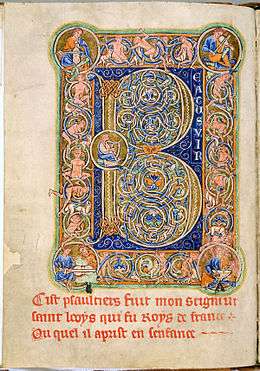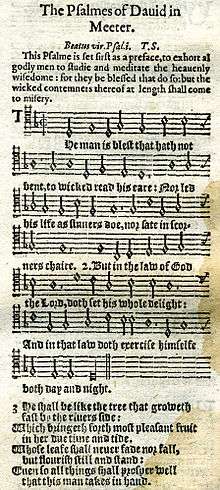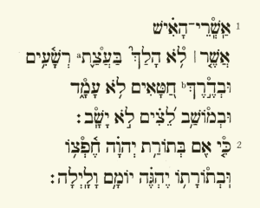Psalm 1
Psalm 1 is the first psalm of the Book of Psalms, beginning in the English King James Version: "Blessed is the man". The Book of Psalms is part of the third section of the Hebrew Bible,[1] and a book of the Christian Old Testament. In Latin, this psalm is known as Beatus vir [2] or Beatus vir, qui non abiit.[3]
| Psalm 1 | |
|---|---|
 Large Beatus initial from the Leiden Psalter of Saint Louis, 1190s | |
| Other name |
|
| Language | Hebrew (original) |
The psalm is a regular part of Jewish, Catholic, Anglican, and Protestant liturgies.
Text
Hebrew Bible version
Following is the Hebrew text of Psalm 1:[4]
| Verse | Hebrew |
|---|---|
| 1 | אַֽשְֽׁרֵ֥י הָאִ֗ישׁ אֲשֶׁ֚ר לֹ֥א הָלַךְ֘ בַּֽעֲצַ֪ת רְשָׁ֫עִ֥ים וּבְדֶ֣רֶךְ חַ֖טָּאִים לֹ֥א עָמָ֑ד וּבְמוֹשַׁ֥ב לֵ֜צִ֗ים לֹ֣א יָשָֽׁב |
| 2 | כִּ֚י אִ֥ם־בְּתוֹרַ֥ת יְהֹוָ֗ה חֶ֫פְצ֥וֹ וּבְתֽוֹרָת֥וֹ יֶהְ֜גֶּ֗ה יוֹמָ֥ם וָלָֽיְלָה |
| 3 | וְהָיָ֗ה כְּעֵץ֘ שָׁת֪וּל עַל־פַּלְגֵ֫י מָ֥יִם אֲשֶׁ֚ר פִּרְי֨וֹ | יִתֵּ֬ן בְּעִתּ֗וֹ וְ֖עָלֵהוּ לֹ֣א יִבּ֑וֹל וְכֹ֖ל אֲשֶׁר־יַֽעֲשֶׂ֣ה יַצְלִֽיחַ |
| 4 | לֹא־כֵ֥ן הָֽרְשָׁעִ֑ים כִּ֥י אִם־כַּ֜מֹּ֗ץ אֲשֶׁר־תִּדְּפֶ֥נּוּ רֽוּחַ |
| 5 | עַל־כֵּ֚ן | לֹֽא־יָקֻ֣מוּ רְ֖שָׁעִים בַּמִּשְׁפָּ֑ט וְ֜חַטָּאִ֗ים בַּֽעֲדַ֥ת צַדִּיקִֽים |
| 6 | כִּֽי־יוֹדֵ֣עַ יְ֖הֹוָה דֶּ֣רֶךְ צַדִּיקִ֑ים וְדֶ֖רֶךְ רְשָׁעִ֣ים תֹּאבֵֽד |
King James Version
- Blessed is the man that walketh not in the counsel of the ungodly, nor standeth in the way of sinners, nor sitteth in the seat of the scornful.
- But his delight is in the law of the LORD; and in his law doth he meditate day and night.
- And he shall be like a tree planted by the rivers of water, that bringeth forth his fruit in his season; his leaf also shall not wither; and whatsoever he doeth shall prosper.
- The ungodly are not so: but are like the chaff which the wind driveth away.
- Therefore the ungodly shall not stand in the judgment, nor sinners in the congregation of the righteous.
- For the LORD knoweth the way of the righteous: but the way of the ungodly shall perish.
Numbering
The Book of Psalms is subdivided into five parts. Psalm 1 is found in the first part, which includes psalms 1 through 41.[5] It has been counted as the beginning of part one in some translations, in some counted as a prologue, and in others Psalm 1 is combined with Psalm 2.[6]
Background and themes
Beatus vir, "Blessed is the man ..." in Latin, are the first words in the Vulgate Bible of both Psalm 1 and Psalm 112 (111). In illuminated manuscript psalters the start of the main psalms text was traditionally marked by a large Beatus initial for the "B" of "Beatus", and the two opening words are often much larger than the rest of the text. Between them these often take up a whole page. Beatus initials have been significant in the development of manuscript painting, as the location of several developments in the use of initials as the focus of painting.[7]
Patrick D. Miller suggests that Psalm 1 "sets the agenda for the Psalter through its "identification of the way of the righteous and the way of the wicked as well as their respective fates" along with "its emphasis on the Torah, the joy of studying it and its positive benefits for those who do".[8] Stephen Dempster suggests that the psalm serves also as an introduction to the Writings, the third section of the Tanakh. Dempster points out the similarities between Psalm 1:2–3 and Joshua 1:8–9 (the first chapter of the Prophets) – in both passages, the one who meditates on the law prospers:
- This Book of the Law shall not depart from your mouth, but you shall meditate in it day and night, that you may observe to do according to all that is written in it. For then you will make your way prosperous, and then you will have good success.[9]
Like many of the psalms, it contrasts the "righteous" person (tzadik צדיק) with the "wicked" or "ungodly" (rasha` רשע) or the "sinner" (chatta' חטא). The righteous person is one who takes care to know the laws of God and so has good judgment and avoids bad company. The result is the ability to withstand difficult times in life supported by God's protection.[10] On the other hand, the wicked person's behavior makes them vulnerable to disaster, like chaff blowing away in the wind. The point that the wicked and the righteous will not mingle at the judgment is clearly stated by the writer. The path the wicked have chosen leads to destruction, and at the judgment they receive the natural consequences of that choice.[11]
The righteous man is compared to a tree planted by a stream. His harvest is plentiful, and whatever he does flourishes. The prophet Jeremiah wrote a similar passage: “But blessed is the man who trusts in the LORD, whose confidence is in him. He will be like a tree planted by the water that sends out its roots by the stream.” He elaborated: “It does not fear when heat comes; its leaves are always green. It has no worries in a year of drought and never fails to bear fruit.” Jeremiah implied that an advantage of trusting in the LORD was the ability to withstand difficult times.[10]
Uses
Judaism
Psalms 1, 2, 3, and 4 are recited on Yom Kippur night after Maariv.[12]
Verse 1 is quoted in the Mishnah in Pirkei Avot (3:2), wherein Haninah ben Teradion explains that a group of people that does not exchange words of Torah is an example of the psalm's "company of scoffers".[13]
Psalm 1 is recited to prevent a miscarriage.[14]
Christianity

In the Church of England's Book of Common Prayer, Psalm 1 is appointed to be read on the morning of the first day of the month.[3]
English poet John Milton translated Psalm 1 into English verse in 1653. Scottish poet Robert Burns wrote a paraphrase of it, referring to "the man, in life wherever plac'd, ... who walks not in the wicked's way, nor learns their guilty lore!"[15]
Some see the Law and the work of the Messiah set side by side in Psalms 1 and 2, 18 and 19, 118 and 119.They see the law and the Messiah opening the book of Psalms.[16][17]
Book 1 of Psalms begins and ends with 'the blessed man'. A blessed man in Psalm 1. A blessed man in Psalm 40 and 41. "Beautifully structured the first book concludes just as it started" [18] Many see the 'blessed man being Jesus.' [19]
Musical settings
Music artist Kim Hill recorded a contemporary setting of Psalm 1.
The Psalms Project released its musical composition of Psalm 1 on the first volume of its album series in 2012. [20]
References
- Mazor 2011, p. 589.
- Parallel Latin/English Psalter / Psalmus 1 Archived 11 November 2016 at the Wayback Machine medievalist.net
- Church of England, Book of Common Prayer: The Psalter as printed by John Baskerville in 1762
- "Tehillim - Psalms - Chapter 1". Chabad.org. 2019. Retrieved 26 January 2019.
- Richard J. Clifford (2010). Michael D. Coogan (ed.). The New Oxford Annotated Bible: New Revised Standard Version, With The Apocrypha: Fully Revised Fourth Edition: College Edition. Oxford: Oxford University Press. p. 773.
- Dummelow, J.R. The One Volume Bible Commentary. 1936. Macmillan Company. P. 328-329.
- Otto Pächt, Book Illumination in the Middle Ages (trans fr German), pp. 85–90, 1986, Harvey Miller Publishers, London, ISBN 0199210608
- Miller, Patrick D (2009). "The Beginning of the Psalter". In McCann, J. Clinton (ed.). Shape and Shaping of the Psalter. pp. 85–86.
- Stephen G. Dempster, "The Prophets, the Canon and a Canonical Approach" in Craig Bartholomew et al (eds.), Canon and Biblical Interpretation, p. 294.
- Jeremiah 17:7–9; Commentary on Jeremiah 17:8, Earle, Ralph, Adam Clarke’s Commentary on the Holy Bible, Beacon Hill Press 1967, p. 627
- Commentary on Psalm 1:6; Matthew Henry's Commentary on the Whole Bible, Vol. III, 1706–1721, p. 390 read online
- Brauner, Reuven (2013). "Shimush Pesukim: Comprehensive Index to Liturgical and Ceremonial Uses of Biblical Verses and Passages" (PDF) (2nd ed.). p. 31.
- Scherman 2003, p. 557.
- "Birth". Daily Tehillim. Retrieved 26 January 2019.
- Psalm 1 – A Paraphrase by Robert Burns Archived 16 February 2018 at the Wayback Machine, accessed 2 August 2016
- https://journal.rts.edu/article/messianic-nature-psalm-118/
- Jamie A. Grant, The King as Exemplar: The Function of Deuteronomy’s Kingship Law in the Shaping of the Book of Psalms (AcBib 17; Atlanta: Society of Biblical Literature, 2004),
- https://books.google.com/books?id=Q3tSDAAAQBAJ&pg=PT110&lpg=PT110&dq=blessed+man+at+start+and+end+of+psalms+book+1++psalm+1+and+psalm+41&source=bl&ots=UquU2twS69&sig=ACfU3U3agw4Y9B3JjuaZg4Ym_UlQV4zHvQ&hl=en&sa=X&ved=2ahUKEwjPtu28177oAhUDQq0KHWbvBgsQ6AEwEHoECAsQAQ#v=onepage&q=blessed%20man%20at%20start%20and%20end%20of%20psalms%20book%201%20%20psalm%201%20and%20psalm%2041&f=false
- http://www.reformationtheology.com/2008/02/the_blessed_man_of_psalm_one.php
- "Music". The Psalms Project. Retrieved 12 June 2020.
Cited sources
- Mazor, Lea (2011). Berlin, Adele; Grossman, Maxine (eds.). Book of Psalms. The Oxford Dictionary of the Jewish Religion. Oxford University Press. ISBN 978-0-19-973004-9.CS1 maint: ref=harv (link)
- Scherman, Rabbi Nosson (2003). The Complete Artscroll Siddur (3rd ed.). Mesorah Publications, Ltd. ISBN 978-0-89-906650-9.CS1 maint: ref=harv (link)
Further reading
- Berlin, Adele and Brettler, Marc Zvi, The Jewish Study Bible, Oxford University Press, Oxford, New York p. 1284-1285.
External links
| Wikisource has original text related to this article: |
| Wikimedia Commons has media related to Psalm 1. |
- Pieces with text from Psalm 1: Scores at the International Music Score Library Project (IMSLP)
- Psalm 1: Free scores at the Choral Public Domain Library (ChoralWiki)
- Psalms Chapter 1 תְּהִלִּים text in Hebrew and English, mechon-mamre.org
- Text of Psalm 1 according to the 1928 Psalter
- Psalm 1 – The Way of the Righteous and the Way of the Ungodly text and detailed commentary, enduringword.com
- Blessed is the man who does not walk in the counsel of the wicked text and footnotes, usccb.org Unites States Conference of Catholic Bishops
- PSAL. I. / Bless'd is the man who hath not walk'd astray translation by John Milton, dartmouth.edu
- Psalm 1:1 introduction and text, biblestudytools.com
- Psalm 1 / Refrain: The Lord knows the way of the righteous. Church of England
- Psalm 1 at biblegateway.com
- Calvin's Commentaries, Vol. 10: Psalms, Part I, tr. by John King, (1847-50) / PSALM 1. sacred-texts.com
- Charles H. Spurgeon: Psalm 1 detailed commentary, archive.spurgeon.org
- Psalm 1 in Hebrew and English with commentary on specific Hebrew words.
- The happy man of Psalm 1, from the Jewish Bible Quarterly
- "Hymns for Psalm 1". hymnary.org. Retrieved 25 February 2020.
